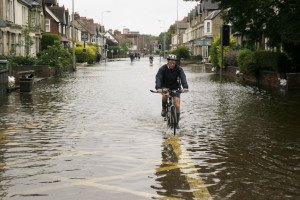With more than 300 flood warnings in place – 16 being severe, so posing a danger to life – across England and Wales, firefighters have been severely stretched just weeks after Fire-Service cutbacks were felt in the capital.
Fire chiefs have justified a nationwide programme of cuts, which led last month to the closure of Clerkenwell Fire Station, on the grounds that the number of fires has plummeted by 64% over the past decade.
But with floods set to persist – or even worsen – for several weeks yet, and storms predicted to rise in both frequency and intensity (if you believe the consensus on climate change), the Fire Service may be needed more than ever – albeit because of excessive water rather than fire.
So the flooding crisis has not only cast doubt on the wisdom of scaling back the service, but also raised questions about the nature of its role and the equipment it needs.
A month’s rain falling in less than an hour has become a commonplace phenomenon recently, and relentless rain and severe weather are forecast to continue, inevitably leading to more rivers overflowing their banks, additional sea flooding and damage such as the destruction of the only railway line into Cornwall and the increased incidence of surface-water floods resulting from heavy rainfall, such as on the Somerset Levels.
Cause and effect
The effects of flooding include swamped homes, injured people, streets awash with debris and water, disrupted communications, cancelled sports fixtures, impassable roads and railway lines, damaged infrastructure, shattered or blocked drainage and sewage systems and collapsing coastlines, not to mention the risk to human life from drowning.
Firefighters’ duties
The UK’s FRSs already have a rescue remit to release people trapped in vehicles as a result of road traffic incidents. But although not part of their statutory duties – they are entitled to charge for pumping out floodwater – firefighters have been willingly helping people affected by floods in their homes and in flooded countryside, using high-volume and specialist pumps and flood rescue teams often made up of people from individual fire services working together.
They have also been carrying out house-to-house checks, issuing warnings, evacuating homes – even an entire town in Jaywick, on England’s east coast – sending out rescue boats, freeing people from submerged vehicles, rescuing a caravan park and protecting infrastructure, all while offering welfare support to distressed people affected by the floods. The service has also given safety advice to people in the event of a flood on how to prepare, something most people do not do, and what to do and not do once a flood has started.
As the extreme weather events that the UK is currently experiencing are predicted to become more frequent in the future, an increasing number of fire crews are being trained to assist in the event of a flood and the number of emergency rescue teams in England and Wales equipped to tackle flooding has more than quadrupled, with £2.5m allocated to fund water rescue teams, mostly within the fire service, until 2017. Firefighters are also being trained in helping people trapped in swollen rivers.
Investigating the causes
Meanwhile Essex FRS has announced it will become the first FRS in the UK to investigate the causes of flooding and then work with communities to reduce the problems that cause it and drive down flood incidents.
Will other FRSs follow suit?
2023 Fire Safety eBook – Grab your free copy!
Download the Fire Safety in 2023 eBook, keeping you up to date with the biggest news and prosecution stories from around the industry. Chapters include important updates such as the Fire Safety (England) Regulations 2022 and an overview of the new British Standard for the digital management of fire safety information.
Plus, we explore the growing risks of lithium-ion battery fires and hear from experts in disability evacuation and social housing.
